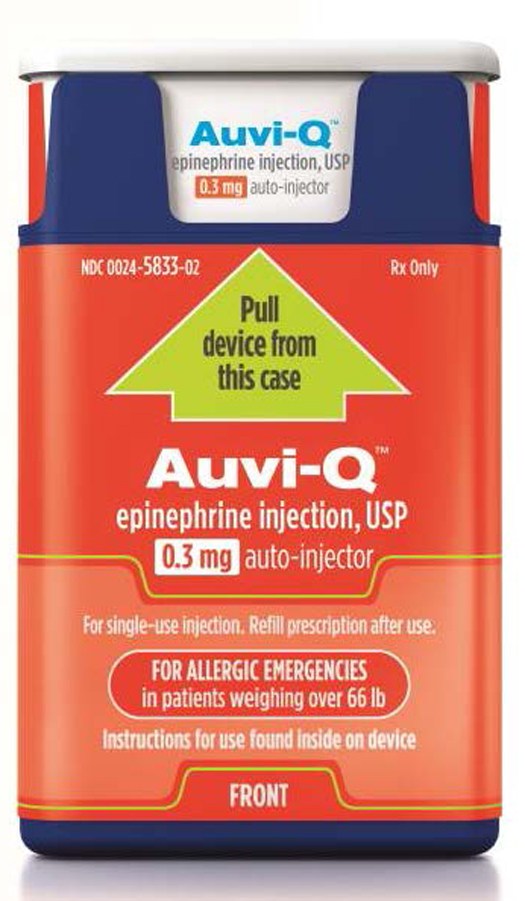 Please see the FAQs below regarding the AUVI-Q® temporary supply in Canada. These answers were provided by Health Canada and kaléo, the AUVI-Q manufacturers.
Please see the FAQs below regarding the AUVI-Q® temporary supply in Canada. These answers were provided by Health Canada and kaléo, the AUVI-Q manufacturers.
Questions about the product
Q: What is AUVI-Q?
AUVI-Q (epinephrine injection, USP) auto-injector is used to treat life-threatening allergic reactions, including anaphylaxis, in people who are at risk for or have a history of serious allergic reactions. AUVI-Q is the only compact epinephrine auto-injector with a voice prompt system that guides a user with step-by-step instructions through the delivery process, and a needle that automatically retracts after the epinephrine injection is complete. Following the use of AUVI-Q, patients or caregivers should seek emergency medical attention.
Q: Why is AUVI-Q being distributed in Canada rather than Allerject?
In response to the ongoing shortage of epinephrine auto-injectors in Canada, Health Minister Ginette Petitpas Taylor signed an Interim Order on August 29, 2018, authorizing the importation and sale of U.S. Food and Drug Administration (FDA) approved 0.3 mg and 0.15 mg AUVI-Q auto-injectors to patients at risk for, or have a history of, serious allergic reactions.
Q: How does Allerject compare to AUVI-Q? What are the key differences?
AUVI-Q, manufactured by kaléo, has been approved by the U.S. Food and Drug Administration. It is comparable to Allerject, a product also made by kaléo, which is authorized and was previously marketed in Canada. The primary difference between AUVI-Q and Allerject is that the U.S. product does not include French labelling and instructions. However, a French version of AUVI-Q labelling and instructions will be provided with the AUVI-Q product at the time of sale to help ensure that patients administer the drug safely and effectively.
Q: Why is Canada allowing AUVI-Q when it is the same as Allerject, a product that was recalled from the market in 2015 because of device malfunctions?
Allerject was recalled from the Canadian market in 2015 by Sanofi Canada because of issues that may have affected the delivery of the required amount of the drug, epinephrine. In 2017, AUVI-Q was re-launched in the U.S. by kaléo. According to kaléo, the company conducted a thorough manufacturing assessment and invested in new technology and quality systems to ensure accurate, reliable and consistent delivery from the product. AUVI-Q is approved by the U.S. Food and Drug Administration, and all sites involved in its manufacturing are compliant with Good Manufacturing Practices (part of an internationally recognized quality assurance standard for drug manufacturing).
Questions on the temporary supply of AUVI-Q
Q: How can I access AUVI-Q? Is a new prescription required from my doctor or can I just ask my pharmacist?
EpiPen® and other epinephrine auto-injectors are medications used to treat life-threatening allergic reactions including anaphylaxis in people who are at risk for, or have a history of, serious allergic reactions. Healthcare professionals diagnose, recommend management and closely monitor people with life-threatening allergies.
As with EpiPen auto-injectors, Health Canada does not require that a prescription be issued for AUVI-Q before sale in Canada. However, different provinces and territories or insurance providers may require a prescription, depending on provincial or territorial requirements. Consumers should contact their pharmacist or health care provider for information on how to obtain AUVI-Q.
Q: Is AUVI-Q more expensive than EpiPen? Is AUVI-Q covered in the same way EpiPen is, or will I have to pay more than I would for EpiPen?
Yes, AUVI-Q is more expensive than EpiPen. There are differences in technology between the AUVI-Q and EpiPen auto-injectors.
The management of drugs is a shared responsibility between federal, provincial and territorial governments. Health Canada authorizes drugs for sale on the basis of safety, efficacy and quality. Provincial and territorial governments are responsible for the administration and delivery of healthcare, including deciding which drugs are covered for their eligible populations. Each province decides whether to cover the cost of a drug, based on its own circumstances. Further information on the coverage of a specific drug can be found by contacting the relevant drug plan.
Kaléo is currently in discussions with each provincial program to determine eligibility of coverage.
Q: How can I get a trainer for AUVI-Q?
Please speak to your pharmacist about how to obtain a trainer for AUVI-Q.
Q: Why isn’t the 0.15 mg AUVI-Q format being brought in right away as well?
At this time, the urgent need is for the 0.3 mg dose, which is why the focus is on that product. AUVI-Q 0.15 mg is not being imported immediately since, according to Pfizer Canada, there continues to be some supply of EpiPen Jr (0.15 mg), which is being carefully managed by Pfizer Canada at the national level. AUVI-Q 0.15 mg may be made available under the Interim Order in future, as required, depending on need and product availability. The Interim Order allows for the import and distribution of both doses.
EpiPen Jr (0.15 mg) is for children weighing 15–30 kg (33–66 lbs). EpiPen (0.3 mg) is for adults and children weighing 30 kg (66 lbs) or more.
Q: My pharmacy does not have the AUVI-Q. Can I ask them to order it?
Yes, you can ask your pharmacist to order the product.
Q: Will AUVI-Q be available going forward or is this temporary? Will Allerject be coming back to Canada?
Kaléo, the maker of AUVI-Q, is working with Health Canada on a long-term solution to bring Allerject back to the Canadian market before expiration of the Interim Order for AUVI-Q.
Tags: Allerject, auto-injector, auvi-q, EpiPen, faq, shortage